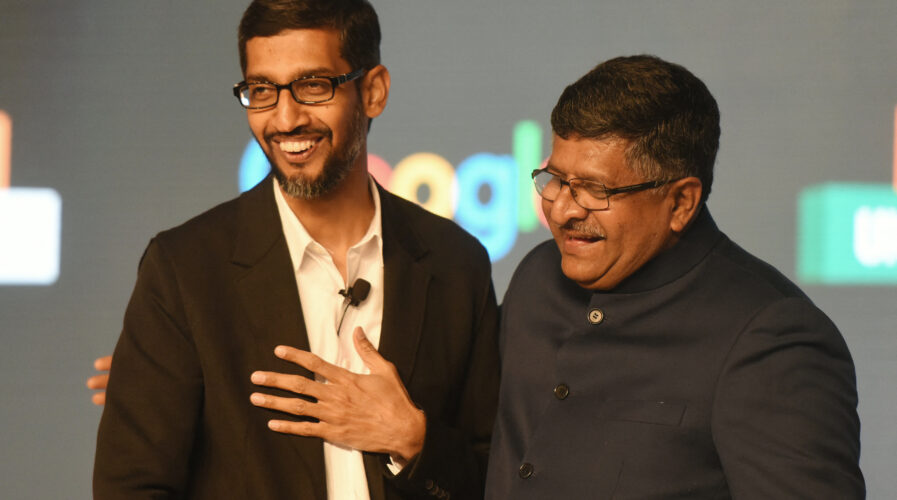
Google chief Sunder Pichai (L) with India’s IT, Law, and Justice Minister Ravi Shankar Prasad (R). (Photo by Dominique Faget / AFP)
India’s new social media rules explained
- The new rules come weeks after Twitter declined to comply with some of New Delhi’s orders amid a protest by farmers in the capital city
- Firms must enable traceability of end-to-end encrypted messages and establish local offices to deal with law enforcement and user grievances
- India’s move comes as governments around the world are closely examining the impact of tech firms on their citizens and local industries
In February this year, India – one of the top three internet markets in the world with close to 700 million users – announced sweeping rules to regulate social media firms, streaming services, and digital news outlets. The new social media rules require firms to not just enable traceability of end-to-end encrypted messages, but also establish local offices staffed with senior officials to deal with law enforcement and user grievances.
The new IT ruling, if anything, poses new challenges for giants such as Facebook, Twitter, Google, and Netflix that count Asia’s third-largest economy as a key overseas market. India’s IT, Law, and Justice Minister Ravi Shankar Prasad said that social media companies will be required to acknowledge takedown requests of unlawful, misleading, and violent content within 24 hours and deliver a complete redressal within 15 days. Insensitive cases such as those surrounding explicit sexual content, firms will be required to take down the content within 24 hours.
India’s new social media rules
The new rules, which have been in the works since 2018, come weeks after Twitter declined to comply with some of New Delhi’s orders amid a protest by farmers in the capital city. The government said at the time that Twitter couldn’t act as the judge, or justify non-compliance.
Firms will also be required to publish a monthly compliance report to disclose the number of requests they have received, as well as specify the actions they took. They will also be required to offer a voluntary option to users who wish to verify their accounts. The new rules, which replace the law from 2011, go into effect for small firms effective immediately, but “significant” services will be provided three months to comply after the date of notification — which will be “very soon,” said Prasad.
New Delhi has put together these guidelines because citizens in India have long requested a “mechanism to address grievances,” said Prasad. India has been working on a law aimed at intermediaries since 2018 and in the past year, broadened its scope to cover streaming services and online news publications.
“India is the world’s largest open Internet society and the Government welcomes social media companies to operate in India, do business and also earn profits. However, they will have to be accountable to the Constitution and laws of India,” he said.
Prasad also said WhatsApp had amassed 530 million users in India, its biggest market. YouTube had 448 million users, Facebook’s marquee service 410 million users, Instagram 210 million users, and Twitter, 17.5 million users in the country.
What are firms doing about it?
Top government sources said Facebook, WhatsApp, Sharechat, LinkedIn, Koo, Telegram, and Google on Friday complied with the new rules and shared with the Ministry of Information Technology details of their chief compliance officer, nodal contact person, and grievance officer to address local complaints regarding unlawful messages.
Most recently, Google chief executive Sundar Pichai said the tech giant is committed to complying with India’s new IT rules, which came into effect on May 25. He said Google’s local teams are engaged in talks with the government and that it will approach the new rules with the same framework as it does for others, i.e. complying with local laws.
News agency PTI, quoting sources, said besides Google, Facebook and WhatsApp have shared details with the IT ministry as per the requirement of the government’s new social media rules. Twitter however is not following new rules, it said. “Twitter has not sent details of a compliance officer to IT ministry and named a lawyer as a grievance officer,” PTI sources said.
The hassle of the ruling is that social media companies with large user bases in the country will have to significantly alter their operating model to accommodate the new mandates from the Indian government under the Information Technology (Intermediary Guidelines and Digital Media Ethics Code) Rules 2021, as part of Section 79 of the Information Technology Act.
Messaging apps such as WhatsApp or Signal will likely have to dilute end-to-end encryption to trace the “first originator” of flagged messages. Platforms like Facebook will also have to create a new interface for India, which will give users the option to verify users through authorized know-your-customer (KYC) processes and display a verification tag for those who seek this. While WhatsApp will have to devise a means of showing the verification tag, Twitter will have to roll out the verified blue tick feature for everyone who wants it.
READ MORE
- How Japan balances AI-driven opportunities with cybersecurity needs
- Google parent Alphabet eyes HubSpot: A potential acquisition shaping the future of CRM
- Microsoft splits Teams from Office Suite; who benefits?
- Intel reinvents in semiconductor industry amid US$7 billion loss
- Unveiling the reality of incognito mode from Google and online privacy
